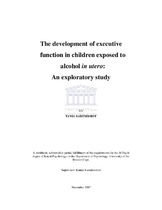| dc.contributor.advisor | Kamaloodien, Kamal | |
| dc.contributor.author | Badenhorst, Tania | |
| dc.date.accessioned | 2014-10-15T10:39:41Z | |
| dc.date.available | 2014-10-15T10:39:41Z | |
| dc.date.issued | 2007 | |
| dc.identifier.uri | http://hdl.handle.net/11394/3780 | |
| dc.description | Magister Psychologiae - MPsych | en_US |
| dc.description.abstract | The study made use of cross-sectional design that compared the performance of younger children (6- to 7-year-olds) with that of older children (12- to 13-year-olds) on various measures of executive function. Within this, it made use of a natural experimental design, with children exposed to alcohol as the experimental group and non-exposed children as the control group. | en_US |
| dc.language.iso | en | en_US |
| dc.subject | Foetal alcohol syndrome (FAS) | en_US |
| dc.subject | Prenatal exposure to alcohol | en_US |
| dc.subject | Executive function | en_US |
| dc.subject | Development | en_US |
| dc.subject | Developmental delays | en_US |
| dc.subject | Children | en_US |
| dc.subject | Western Cape Province | en_US |
| dc.subject | Cross-sectional study | en_US |
| dc.subject | Exploratory research | en_US |
| dc.subject | NEPSY | en_US |
| dc.title | The development of executive function in children exposed to alcohol in utero: an exploratory study | en_US |
| dc.rights.holder | uwc | en_US |

